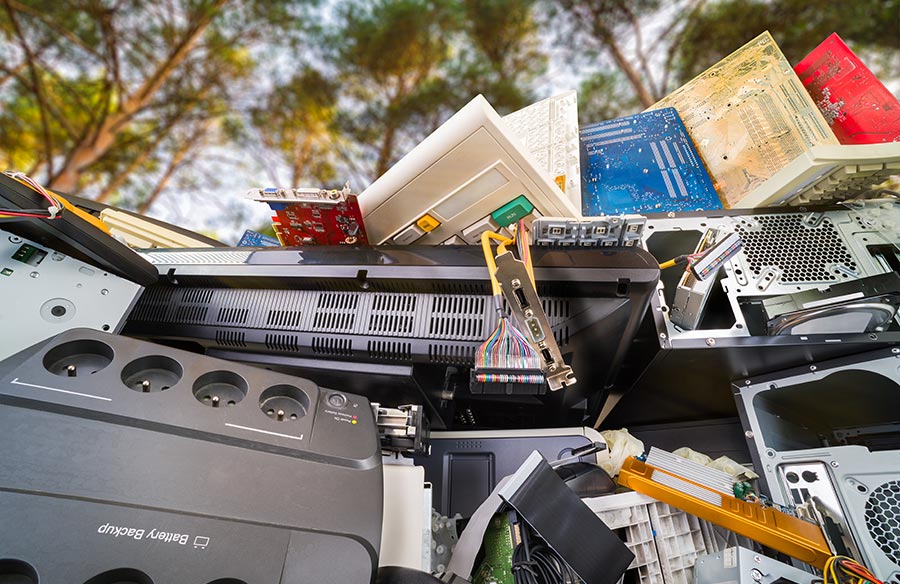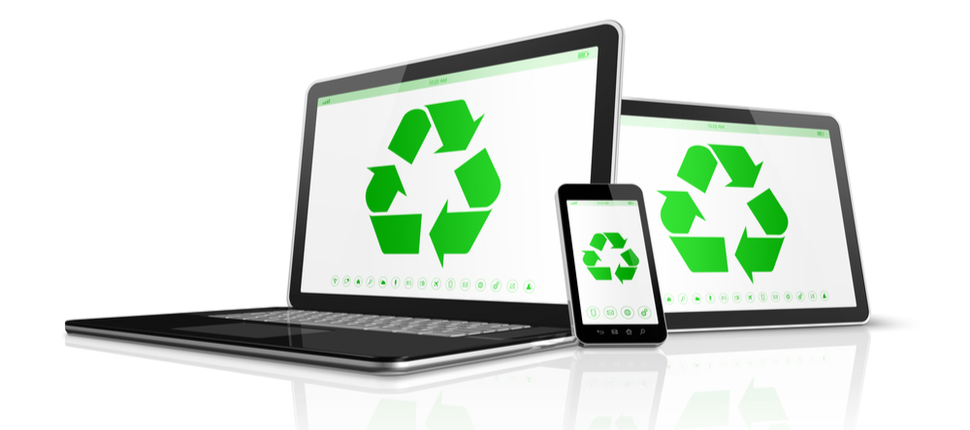Sustainable IT Solutions: Trustworthy Computer System Recycling Provider
As technology remains to progress at a quick rate, the issue of electronic waste, or e-waste, has ended up being a pushing problem for both people and organizations alike. The incorrect disposal of computer systems and various other digital tools not just adds to environmental deterioration, however likewise presents substantial threats to human wellness. In light of this, the need for reliable computer system reusing solutions has actually never ever been even more paramount. In this discussion, we will explore the environmental impact of e-waste, the benefits of responsible computer recycling, just how to pick a reliable recycling solution, the reusing procedure for computer systems and electronic gadgets, and the role of federal government policies in e-waste administration. Join us as we uncover the sustainable IT solutions that can help us browse the intricacies of digital waste in a accountable and reputable way.
The Environmental Influence of E-Waste
The incorrect disposal of electronic waste, generally referred to as e-waste, has significant ecological ramifications. E-waste refers to thrown out electronic tools such as smartphones, televisions, and computers (computer recycling). These tools include unsafe materials such as lead, mercury, cadmium, and brominated fire retardants, which can be unsafe to both human health and wellness and the setting otherwise appropriately managed
When e-waste is incorrectly gotten rid of, it usually winds up in land fills or is incinerated, releasing hazardous substances into the soil, water, and air. The release of these harmful products can contaminate groundwater, pollute the air, and add to dirt degradation, positioning significant health risks to close-by areas and communities.
Moreover, the inappropriate disposal of e-waste also adds to the exhaustion of all-natural sources. computer recycling. If correctly recycled, numerous electronic gadgets consist of useful steels like gold, silver, and copper that can be recouped and recycled. When e-waste is not reused, these beneficial sources are shed, and the demand for new raw products rises, leading to enhanced mining tasks and additional ecological deterioration.
To alleviate the ecological effect of e-waste, appropriate recycling and disposal methods should be employed. This consists of the accountable collection, taking apart, and recycling of electronic tools to recover important products and make certain the risk-free administration of hazardous materials. Applying efficient e-waste administration practices is crucial to secure the atmosphere, conserve sources, and promote a lasting future.

Benefits of Liable Computer Recycling
Properly reusing computers offers a plethora of advantages, including ecological preservation and source conservation. Liable computer reusing not only aids stop electronic waste from winding up in garbage dumps, but it additionally decreases the demand for basic materials and power in the production of brand-new devices.
One of the most substantial advantages of responsible computer recycling is the conservation of the setting. When electronic waste is improperly thrown away, it can release harmful materials such as lead, mercury, and cadmium into the dirt and water, posing a hazard to communities and human wellness. By recycling computer systems, these harmful materials can be securely removed and disposed of, lessening the risk of contamination.
An additional benefit is resource conservation. Computer systems have important materials like gold, copper, silver, and aluminum, which can be recovered and reused with reusing procedures. By removing and recycling these products, the need for extracting new resources is decreased, saving natural sources and minimizing the ecological influence of source extraction.
In addition, accountable computer system reusing aids to lower power intake. Production brand-new computer systems calls for a significant amount of energy, from the extraction of basic materials to the assembly procedure. By reusing computer systems and recycling their elements, the energy-intensive production process can be prevented, resulting in a reduction in greenhouse gas emissions and a more sustainable use of power sources.
Just How to Select a Trustworthy Computer Recycling Service
When selecting a computer reusing solution, it is very important to think about a few key factors to ensure that you pick a trustworthy and trusted provider. It is vital to confirm if the reusing solution follows correct environmental regulations and techniques. A reputable service provider will have certifications and certifications that demonstrate their commitment to accountable recycling. Look for qualifications such as R2 (Accountable Recycling) or e-Stewards, which ensure that the reusing process satisfies strict requirements for environmental management and data protection. Secondly, inspect if the service uses secure information destruction. Data safety is a crucial worry when reusing computers, as delicate details stored on old gadgets can be at risk to theft or misuse. A reliable recycling service ought to have secure information devastation protocols in area, such as information wiping or physical damage of storage space tools. Additionally, think about the solution's track document and reputation. Search for evaluations or endorsements from previous customers to evaluate their degree of consumer satisfaction and reliability. Think about the solution's openness and liability. A trustworthy service provider must have the ability to give thorough details about their recycling procedure, consisting of just how they take care of hazardous products and make certain correct disposal. By considering these factors, you can choose a computer system reusing solution that is honest, trustworthy, and eco accountable.
The Recycling Process for Computer Systems and Digital Instruments
To ensure liable disposal and lessen ecological impact, understanding the reusing procedure for computers and electronic tools is necessary when choosing a reliable recycling service. The recycling process for these gadgets normally entails a number of phases.
To start with, the devices are gathered from individuals, companies, or drop-off factors. This collection process might involve transportation logistics and protected dealing with to protect the sensitive information had within the devices. Once collected, the devices are sorted based on their type, such as desktops, laptops, or mobile phones.
After sorting, the devices undergo a complete information devastation procedure to guarantee that any kind of individual or sensitive details is completely removed. This action is critical to shield the privacy and security of organizations and individuals. Information devastation techniques might consist of wiping, degaussing, or physical damage of the storage space media.
Next, the devices are taken apart right into their individual parts. This permits for the separation of different materials, such as plastics, metals, and circuit boards. These materials are after that sent to specialized recycling centers for further processing.
The recycling facilities use different techniques to extract valuable materials from the electronic waste. These materials can be recycled or repurposed in the manufacturing of brand-new items. The continuing to be waste is gotten rid of in an eco accountable way, adhering to governing standards.
The Function of Federal Government Laws in E-Waste Monitoring
Federal government regulations play an essential role in the efficient management of e-waste. With the continual development of the electronics Read More Here market and the increasing concern for ecological sustainability, the demand for appropriate disposal and recycling of digital waste has actually become extra noticeable. Government guidelines help to guarantee that e-waste check this is managed in a sustainable and accountable fashion.
Among the key duties of federal government policies is to set requirements and guidelines for e-waste management. These regulations specify the proper techniques for collection, transportation, and recycling of digital waste. By establishing these criteria, governments can make sure that e-waste is managed in a way that minimizes its effect on the atmosphere and human health and wellness.
This consists of carrying out take-back programs, where manufacturers are liable for gathering and recycling electronic waste from consumers. These guidelines assist to change the worry of e-waste monitoring from the private customer to the industry, ensuring that electronic waste is handled in a much more lasting way.

Conclusion
Finally, it is important to think about the ecological effect of e-waste and pick a reliable computer recycling service to sensibly deal with electronic tools. By complying with government regulations and involving in appropriate reusing processes, we can alleviate the negative impacts of e-waste on the setting and promote an extra sustainable future.
In this discussion, we will discover the ecological influence of e-waste, the benefits of liable computer recycling, how to choose a credible recycling service, the recycling procedure for computer systems and digital devices, and the duty of government guidelines in e-waste monitoring. Computers include valuable products like gold, aluminum, copper, and silver, which can be recovered and recycled via recycling processes.Additionally, responsible computer system reusing aids to minimize power usage. Information protection is a vital concern when recycling computers, as sensitive info kept on old gadgets can be prone to burglary or abuse. By taking into consideration these variables, you can pick a go to my blog computer recycling service that is honest, reliable, and ecologically liable.